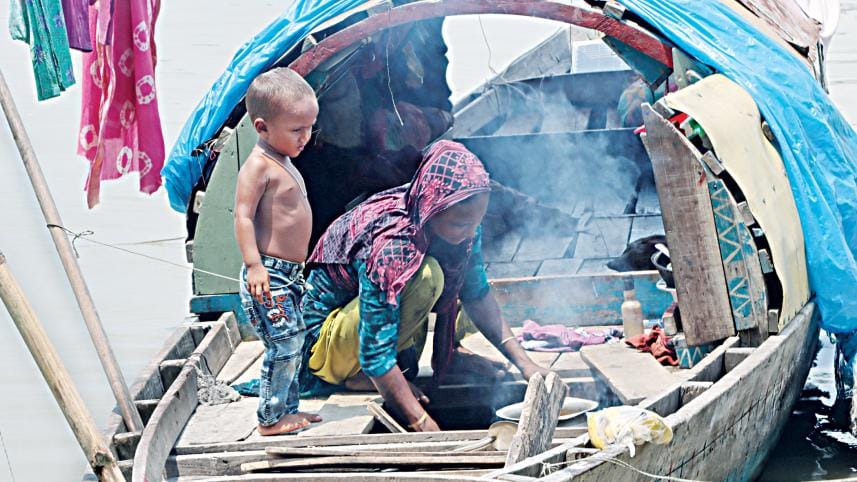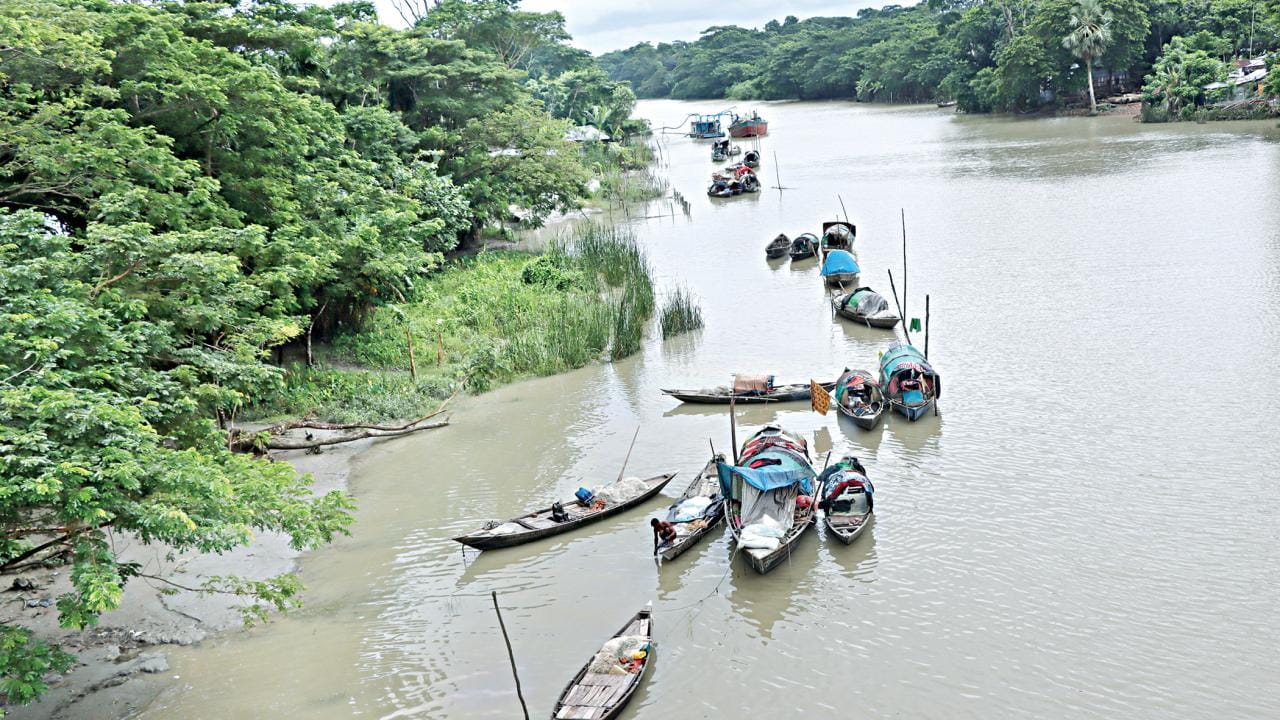The mantas: A life adrift

Along the banks of the Arial Khan River in Laharhat under Barishal Sadar upazila, rows of boats lie anchored side by side, swaying gently with the current. Similar floating clusters can be seen along the Kalabadar River near Bukhainagar.
These are home to the Manta people -- a river-dwelling community that has spent generations living entirely on water.
Fishing is their only means of survival. Using small nets and traditional hooks, they set out at dawn and return by dusk with whatever catch the river offers. Each fleet of boats is led by a "sardar" -- a leader who oversees daily affairs and ensures harmony among the families.
But despite centuries of life on the water, the Mantas remain invisible in official records.

They have no National ID cards, no fisher cards, and receive no government aid. There are no schools for their children, no healthcare for their sick, and no land to call their own.
They live and die on the water -- a people adrift in every sense.
LIFE ON THE WATER
In Char Monai union, just six to seven kilometres from Barishal city, two Manta fleets live along the Kalabadar River, while another floats on the Arial Khan. According to the Department of Social Services and local NGOs, more than 350 people live in these three clusters.
During a recent visit to Bukhainagar and Laharhat, this correspondent spoke with more than 50 Manta men and women. More than half said they do not have NIDs or fisher cards, and none receive any social safety allowances. They said they often visit local union members to seek help, but are turned away because they live on boats and not on land.
Eighteen-year-old Marjina Begum from Bukhainagar recalled her heartbreak. "My son had a cold six months ago," she said softly. "I gave him medicine from a local pharmacy. He died after a week. We had no money to take him to a hospital."

Ayub Ali Sardar, a fleet leader, said most men and women in the community are illiterate. "They can receive phone calls but can't dial numbers," he said. "Children don't go to school. Women usually have four or five children, but none can tell their own or their children's ages."
In one fleet, there are 44 boats -- home to families who have lived their whole lives afloat. Only two men, Ayub Ali and Dulal Sardar, can read and count money. Women, in particular, cannot count.
Most boats have solar lights; about half have small TVs, and nearly all families own mobile phones. But even young people cannot read, write, or dial numbers, though they recognise currency notes easily. Children swim as soon as they can walk, and row boats across wide rivers fearlessly. Yet almost none have ever seen the inside of a classroom.
In Laharhat, the river glitters at sunset, and the boats line up like beads on water. Women sit by the edge of their boats washing utensils, while men mend nets. It is a life full of rhythm but empty of recognition.
Hafez Sardar, another fleet leader, said, "We are landless. We've asked for land many times, but no one helps. Even when someone dies, we depend on the mercy of local chairmen for burial."
Aleya Begum, a mother of five, could name her children but not their ages. When asked to count her fingers, she hesitated and laughed shyly. Most women and teenage girls in the community share this same quiet struggle.
Local NGOs estimate that more than 8,000 to 10,000 Mantas live across Barishal, Bhola, and Patuakhali districts. The Chandradwip Development Society, one of the few organisations working with them, says around 1,000 Mantas live in Barishal Sadar upazila alone.
Azaharul Islam, assistant commissioner (land) of Barishal Sadar upazila, said he has not received any application from the Manta community seeking government khas land.
Manta women give birth on their boats -- always naturally, without medical help. If complications arise, they rely on tablets bought from local shops. To prevent infants from falling into the water, many mothers tie their children with ropes.

At least two children have drowned in Laharhat in recent years, said fleet leader Jasim Sardar.
"Once, when someone died, we would float the body away," recalled 60-year-old Kadomjan Bibi, her eyes fixed on the horizon. "Now, if the chairman allows, we bury them on land. We live and die on the water -- this is our fate."
Almost every child in the community grows up without formal education. NGO workers say nearly 100 percent of the Manta population is illiterate. Recently, four small day-care centres were opened, teaching around 150 children rhymes and basic counting. But their learning rarely lasts.
"These children are eager to learn," said assistant teacher Archana Rani Mistri, who works in one of the centres. "But their families can't afford to send them to school. They move constantly with their boats, so the children can't continue studying."
Girls are typically married off by the age of 14 or 15. For them, childhood is short and work begins early -- fishing, cooking, rowing, or caring for younger siblings.
STRUGGLING FOR RECOGNITION
The Mantas are not officially recognised as fishermen. During the ongoing 22-day fishing ban, they receive no rice rations or government assistance. Last week, over a hundred Manta men and women stood in front of the Muladi upazila fisheries office demanding inclusion in the relief programme.
"We live and die on the river," said Ayub Ali. "Fishing is our only work. But when the ban starts, we have no food. No one helps us. Some of us are forced to fish secretly at night just to survive."
Government records show that in Bhola's Charfassion upazila, 143,438 fishing families are receiving rice aid -- but the Mantas are not among them. Many have already left their river settlements in search of a living elsewhere.
Local fisheries officials admit that only 80 percent of registered fishers receive aid, and the Mantas remain excluded because they were never registered.
"They move from place to place," said Barishal Divisional Fisheries Officer Md Anisuzzaman. "That's why chairmen and members hesitate to include them in the lists."
In the fading evening light, the Arial Khan River glows copper. The sound of children laughing echoes across the water as they splash beside the boats. Women prepare dinner over small clay stoves, and men mend their nets for another uncertain day. It is a quiet world, self-contained, almost forgotten.

For generations, the Manta community has lived and died on the rivers of southern Bangladesh -- stateless, landless, and unseen by the state. Their lives flow with the rivers, governed by the seasons and tides, yet untouched by the rights and protections others take for granted.
Without education, identity, or access to government support, they remain one of the most marginalised and invisible groups in the country, said Gazi Zahid Hossain, convener of the Sacheton Nagorik Committee in Barishal.
"The Mantas have no land, no schools, no hospitals, and no recognition. They are citizens of the river -- born on water, living on water, and dying on water -- while the rest of the world looks away," he added.



 For all latest news, follow The Daily Star's Google News channel.
For all latest news, follow The Daily Star's Google News channel.
Comments